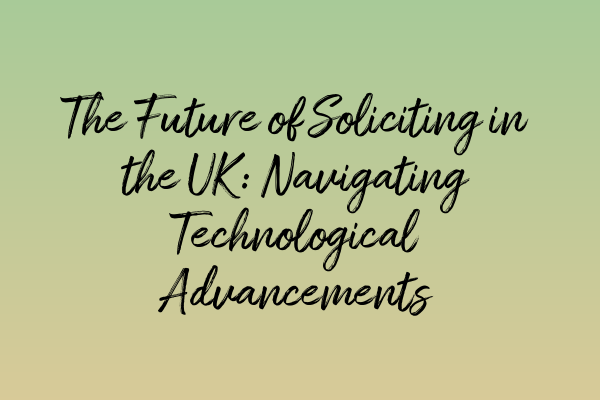The Future of Soliciting in the UK: Navigating Technological Advancements
As the legal profession continues to evolve, it is essential for solicitors in the UK to stay ahead of technological advancements that are shaping the future of legal practice. Embracing technology can unlock new opportunities, streamline processes, and improve client experiences. In this article, we will explore the impact of technology on the soliciting profession and how solicitors can navigate these changes to thrive in the digital age.
The Role of Technology in Modern Legal Practice
Before delving into the future of soliciting, let’s take a closer look at the role technology already plays in modern legal practice. Technology has transformed every aspect of legal work, from research and document management to communication and client collaboration.
Through the use of advanced legal software, solicitors can now perform legal research more efficiently, analyze vast amounts of data with greater accuracy, and automate repetitive tasks. This not only saves valuable time but also improves the overall quality of legal services provided.
Additionally, technology has revolutionized the way solicitors interact with clients. With the rise of online communication platforms, video conferencing, and secure client portals, solicitors can offer remote consultations and streamline document sharing. This increased accessibility and convenience enhance client satisfaction and contribute to a more efficient legal process.
However, while technology has brought numerous benefits to the legal profession, it also presents new challenges and considerations for solicitors to navigate.
The Impact of Artificial Intelligence and Machine Learning
Artificial Intelligence (AI) and machine learning have emerged as powerful tools within the legal sector. These technologies are especially useful for tasks involving data analysis, contract review, and legal research.
AI-powered software can quickly sift through vast amounts of legal documents and extract relevant information, significantly reducing the time and effort required for manual review. Machine learning algorithms can effectively predict legal outcomes based on past cases, enabling solicitors to provide more accurate advice to clients.
While AI and machine learning have the potential to enhance legal practice, solicitors must also be mindful of the ethical and regulatory implications. As with any technology, ensuring transparency, accountability, and a human touch remain vital.
The Rise of Legal Tech Startups
Alongside the advancements made by traditional law firms, the legal sector has seen a rise in legal tech startups. These innovative companies are disrupting the industry by offering specialized software and services tailored to legal professionals.
Legal tech startups are developing tools that automate various aspects of legal work, such as contract drafting, e-discovery, and case management. By harnessing the power of technology, these startups are providing solicitors with more efficient and cost-effective solutions, enabling them to focus on higher-value tasks.
Collaborating with legal tech startups can be an excellent way for solicitors to stay at the forefront of technological advancements and improve their overall service delivery. By embracing these disruptive technologies, solicitors can improve their competitive advantage and deliver better value to their clients.
Navigating Technological Advancements: A Solicitor’s Guide
As solicitors adapt to the changing landscape of legal practice, it is crucial to navigate technological advancements effectively. Here are some key considerations:
- Stay Informed and Engage in Continuous Learning: Keeping up with the latest developments in legal technology is essential. Attend industry conferences, participate in webinars, and engage in continuous learning to stay informed about new tools and trends.
- Choose the Right Legal Software: Invest in legal software that aligns with your specific practice areas and business needs. Whether it’s case management software, document automation tools, or AI-powered research platforms, selecting the right software will help streamline your workflow and enhance your productivity.
- Embrace Collaboration and Partnership: Partner with legal tech startups to explore innovative solutions that can improve your practice. Collaborating with startups can bring fresh perspectives and help you leverage cutting-edge technologies to optimize your service offerings.
- Address Ethical and Regulatory Concerns: Understand the ethical and regulatory implications of new technologies. Ensure that any software or AI systems you use comply with relevant data protection and privacy laws. Maintain transparency with clients about the use of technology and set clear expectations.
- Adapt to Changing Client Expectations: Clients are becoming increasingly tech-savvy and expect their solicitors to embrace technology. Offer secure client portals, virtual meetings, and other digital solutions that align with your clients’ preferences.
In conclusion, the future of soliciting in the UK is intertwined with technological advancements. By embracing digital transformation, solicitors can enhance their practice, improve client experiences, and unlock new opportunities. Staying informed, choosing the right tools, collaborating with legal tech startups, addressing ethical concerns, and adapting to changing client expectations will enable solicitors to navigate this ever-evolving landscape successfully.
For more insights into legal education, industry trends, and the various aspects of becoming a solicitor in the UK, check out our related articles:


Leave a Reply